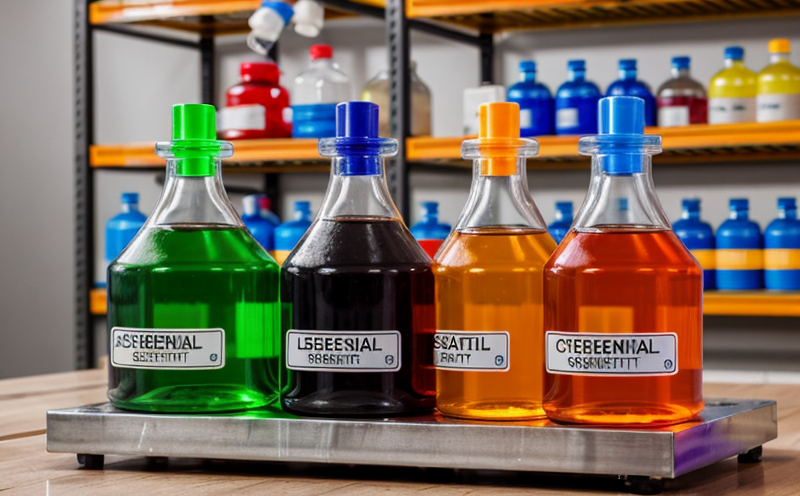Chlorine Content Testing in Household Cleaners
The demand for household cleaners has surged as people seek effective and reliable cleaning solutions. However, with increased awareness about chemical safety and restricted substances, the need to ensure these products are safe for use is paramount. Chlorine content testing plays a critical role in this regard, particularly given chlorine’s potential health impacts when used improperly or overexposure.
Chlorine is widely used as a disinfectant in various household cleaners due to its strong antibacterial and antifungal properties. However, high levels of chlorine can be harmful if not contained within safe limits. Therefore, laboratories specializing in chemical safety testing offer comprehensive services to ensure that the chlorine content in household cleaners meets established standards.
Testing for chlorine content is essential for several reasons:
- To comply with international regulations and guidelines.
- To ensure product safety and efficacy.
- To prevent potential health risks associated with excessive chlorine exposure.
- To maintain brand reputation by providing safe products to consumers.
International standards such as ISO 8469:2017 and ASTM E537 provide robust methodologies for determining the chlorine content in household cleaners. These standards ensure that testing is accurate, reliable, and consistent across different laboratories.
The testing process involves several key steps:
- Sample Preparation: A representative sample of the cleaner is taken and prepared according to standard procedures.
- Instrumentation: The sample is analyzed using advanced spectroscopic techniques like UV-Vis spectrophotometry or titration methods. These instruments provide precise measurements that are crucial for accurate results.
- Data Analysis: Results from the instrumentation are meticulously analyzed to determine the chlorine content accurately. This step ensures compliance with regulatory limits and product specifications.
The importance of this testing cannot be overstated, especially in light of recent incidents involving household products that were found to contain excessive amounts of harmful chemicals. By adhering to stringent testing protocols, laboratories can help prevent such occurrences and ensure the safety of consumers.
Quality managers, compliance officers, R&D engineers, and procurement specialists rely on accurate chlorine content tests to make informed decisions about product formulations and quality control measures. These professionals can rest assured that their products meet regulatory requirements and are safe for consumer use.
Benefits
Conducting chlorine content testing in household cleaners offers numerous advantages:
- Enhanced Product Safety: Ensures that the product does not contain harmful levels of chlorine, thereby protecting consumers from potential health risks.
- Compliance with Regulations: Helps manufacturers and distributors comply with international standards such as ISO 8469:2017 and ASTM E537, avoiding legal penalties and reputational damage.
- Improved Brand Reputation: Demonstrates a commitment to product safety and quality, enhancing brand reputation among consumers.
- Increased Consumer Confidence: Consumers are more likely to trust products that have undergone rigorous testing, leading to higher sales and customer loyalty.
- Reduced Risk of Product Recall: Accurate testing reduces the likelihood of product recalls due to excessive chlorine content, saving costs and time.
- Informed Decision-Making: Provides quality managers and compliance officers with valuable data for making informed decisions about product formulations and quality control measures.
By leveraging these benefits, laboratories can help manufacturers and distributors ensure that their household cleaners meet the highest safety standards. This not only protects consumers but also contributes to a safer environment overall.
International Acceptance and Recognition
The importance of chlorine content testing in household cleaners is widely recognized internationally, with several countries adopting stringent regulations to ensure product safety. For instance:
- United States: The Environmental Protection Agency (EPA) mandates rigorous testing for household cleaning products.
- European Union: The EU’s REACH regulation requires manufacturers to assess the risks associated with chemicals, including chlorine, in their products.
- China: China has implemented strict standards for the content of active ingredients in various consumer products, including household cleaners.
These international regulations underscore the necessity of accurate and reliable testing. Laboratories that adhere to these standards are well-positioned to meet global market demands and ensure product safety.
Competitive Advantage and Market Impact
In today's competitive market, having a reputation for producing safe household cleaners is crucial. Chlorine content testing provides several strategic advantages:
- Differentiation: Brands that prioritize safety are more likely to stand out in the crowded cleaning product market.
- Loyalty: Consumers trust brands that consistently provide safe products, fostering customer loyalty and repeat business.
- Access to New Markets: Compliance with international standards opens doors to new markets where stringent regulations are enforced.
- Cost Savings: By avoiding recalls and legal issues, companies can save significant costs associated with non-compliance.
The ability to offer chlorine content testing services is a competitive differentiator that enhances market position. Laboratories specializing in this service help manufacturers stay ahead of the curve by ensuring compliance with evolving regulations and consumer expectations.





